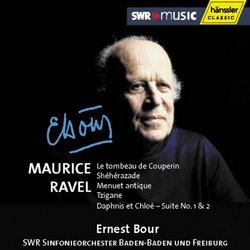Arleen Auger sings Ravel's Sheherazade
M. R. Simpson | St. Davids, PA | 08/05/2009
(5 out of 5 stars)
"Though I have greatly enjoyed this CD, my primary reason for writing a review is simply to let listeners know--since so little information is provided-- that the soprano on the recording is the late Arleen Auger. Her performance of Ravel's magical song cycle Sheherazade dates from 1975, when Auger was 35 or 36 years old--that is, in her peak prime years. In fact, it is the only recording that Auger made of an orchestral song cycle during this period, which makes it very special. The performance itself is marvelous--very exotic, subtle and languorous, and supremely well integrated. There are moments when the interplay between the gorgeous purity of Auger's sound and the orchestra produce some of the most fascinating and other worldly effects. My only possible caveat is that the solo flute playing in the 2nd song--"La Flute enchantee" is interpretatively different from other versions that I know--for instance, it is slightly slower and more deliberate than on Sir John Barbirolli's legendary recording with Dame Janet Baker. While the effect is more languorous, I'm not sure that I've totally adjusted yet. Nevertheless, Auger's vocal performance is every bit in the same class as Baker's performance. There were even times when I felt these songs are more effectively sung by a soprano than a mezzo--particularly in the more dramatic passages.
Conductor Ernest Bour is a most able accompanist, and the orchestral playing of the SWR Symphony Orchestra Baden-Baden and Freiburg is generally first rate--not only in the Sheherazade, but also in the other works as well. Bour had a long time association with this orchestra--spanning over thirty years (he was its chief conductor from 1964 to 1979), and it really shows in the orchestra's superbly unified and disciplined response. In the accompanying booklet, Rainer Peters writes that Bour's conducting style "can best be characterised with the paradoxical expression of ardent objectivity. Bour was a fanatic for detail and clarity who rigourously detected any typing or printing errors, apprehensively admired by publishers and composers alike." Indeed throughout his life Bour maintained an intimate connection to modern composers, conducting world premieres of music by Henze, Penderecki, Berio, Rilm, Stockhausen, and Ligetti, just to name a few. Trivia buffs may be interested to know that he also conducted Ligetti's "Atmospheres" on the soundtrack to Stanley Kubrick's "2001: Space Odyssey," and again, Ligetti's "Lontano" on Kubrick's later film, "The Shining."
As a conductor of Ravel's music, Bour is masterful. He is known for a highly praised recording of Ravel's opera, "L'Enfant Et les Sortileges" on the Testament label. Like Pierre Boulez, Bour's approach to Ravel is highly objective and precise, but with a greater sense of exuberance, color, and rhythmic pacing. He is never coolly analytical, as Boulez can sometimes be. Critic David Hurwitz at "Classics today" writes that "Bour allows you to hear more of Ravel's textual, harmonic and melodic subtleties than just about anyone else, finding music where so many others merely make noise." He also has an uncanny ability to find just the right sense of pacing for each movement, and his building of the frenzied climax at the end of the 2nd Daphnis et Chloe suite is particularly impressive, although not quite as powerful as Charles Munch's wildly ecstatic recording with the Orchestre de Paris. There were also times when I found myself missing some of the gentler, more humanistic qualities that a conductor like Jean Martinon brings to this music. (Martinon seems to find a greater depth of human feeling in Ravel's music than most conductors, including Bour.)
In addition, there is some very fine solo playing from the orchestra. Hurwitz raves about the playing of the oboist in Le tombeau de Couperin--writing, "It's about as close to perfection in this work as I ever hope to hear," and it is exceptional playing, and one of the finest recordings of Le tombeau de Couperin in the catalogue. But I was also equally enamored with the solo flute playing in the "Pantomime" of the 2nd Daphnis et Chloe suite, which is utterly magical. My only mild disappointment was Ravel's Tzigane, played here by Pina Carminelli (of I Musici fame), but I must confess that not even David Oistrakh has been able to convince me of the merits of this work.
The Hannsler recordings span from 1967 to 1977, and are truly excellent--some of the best remasterings I've ever heard (although that is partly attributable to the phenomenal clarity of Bour's readings). The engineers have done a particularly fine job of capturing the full bloom of Auger's voice, which makes this an indispensable CD for her fans, and for lovers of Ravel's wonderfully exotic song cycle. If it weren't for Auger's performance, I'd probably give this CD 4 1/2 stars, but considering the remarkable quality of her singing, and the superb accompaniment provided by Bour and his orchestra, it deserves a full 5 stars. In closing, I would simply add that this CD makes a fine addition to any Ravel collection--I've listened to it many times now, and am still hearing new things; although if you are a newcomer to Ravel's music, I'd probably recommend that you first begin with the recordings of Jean Martinon--now available in a super discount 3-CD set, or Charles Munch, of the more essential masterpieces--that is, the complete Daphnis et Chloe ballet, Pavane for a Dead Princess, and the wonderful Mother Goose suite.
Here are the works performed on this CD, and the dates of their recordings:
Le Tombeau de Couperin (1974)
Sheherazade (1975)
Menuet antique (1977)
Tzigane (1967)
Daphnis et Chloe Suites 1 & 2 (1974)"


 Track Listings (15) - Disc #1
Track Listings (15) - Disc #1